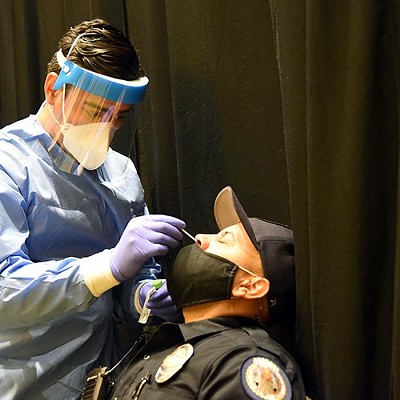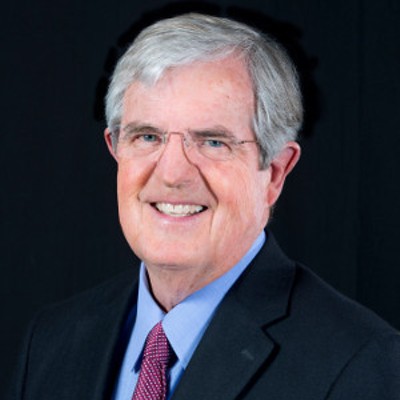FAIR AND UNBALANCED
Pima County Supervisor Ally Miller appears determined to appoint a new member of the Pima County Fair Commission.
Miller, who was elected in 2012, tried last year to get her political crony, talk-radio host Joe Higgins, appointed to the fair commission, which oversees the management of the county fairgrounds.
But the three Democrats on the board blocked Miller's effort to replace Marvin Selke, who has served on the fair commission for more than three decades.
Miller tried again last week with a different pal, David Gerovac (who gave the maximum $430 to Miller early in her 2012 campaign).
That led Pima County Adminstrator Chuck Huckelberry to check with the Pima County Attorney's Office regarding whether Miller's efforts to get rid of Selke (who currently chairs the commission) was legal under county regulations. Huckelberry's research determined that when the supervisors created the county fair commission in 1974, they specifically stated that commissioners could be removed via a majority vote of the Board of Supervisors "for cause"—and we're not lawyers, but a whim of a newbie supervisor doesn't strike as "cause" in the legal sense.
Miller didn't return a phone call to talk about why she's so determined to dump a qualified commissioner who has generously served county taxpayers for decades, but she's been on talk radio explaining that she thinks that it would be good to get "new blood" on the commission.
Pima County Supervisor Sharon Bronson says the rules that prevent supervisors from yanking their appointees without cause are designed to ensure that commissioners are allowed to operate free of political interference from their sponsors.
Selke's term is up at the end of this June, which might allow Miller to replace him—but all the legal research led Huckelberry to another conclusion that might change the current custom of allowing each of the supervisors to nominate a commissioner.
In a memo last week, Huckelberry noted that the resolution that established the fair commission "clearly indicates that members of the Pima County Fair Commission are 'appointed by a majority of the members of the Board of Supervisors.' These are not individual supervisorial appointments. By past convention, there have been individual nominations by district; but any appointment has only been by a majority vote of all the members of the Board of Supervisors. Perhaps the nomination by district process, which has no basis in ordinance or resolution, should be revisited by the board."
Translation: If the majority of Democrats don't like Miller's efforts to disrupt the fair commission, they can just tell her she doesn't get any appointees in the future.
A WHOLE NEW TYPE OF ELECTION FRAUD
The Skinny noted a few weeks back that one of the big stories at the Legislature this year would likely revolve around Republican efforts to repeal an election overhaul that was passed in the final hours of last year's legislative session.
The controversial legislation would have made it a crime for political activists to gather early ballots from voters for delivery to election officials; allowed county election officials to easily purge voters from the permanent early-voter list, or PEVL, a mailing list of people who are automatically sent an early ballot with each election; created a new hurdle for third-party candidates to make the ballot; and made it more difficult for citizens to run initiative efforts to put proposed laws before voters.
But before the law could take effect last year, the Protect Your Right To Vote political committee, backed by labor unions and other lefty groups, funded a referendum drive that was successful in gathering enough signature to put the law on hold until voters decide on it this November.
Republican lawmakers who supported the law say that it was just about making the counting of votes a little more efficient on Election Day and otherwise making sure that fraud did not occur.
But opponents of the law say the changes were driven by the success that Democrats—and particularly Latinos—have had in Get-Out-The-Vote efforts aimed at collecting ballots from early voters. They've dubbed the bill the "Voter Suppression Act."
Republican lawmakers have now realized that they don't want to run this fall having to answer questions about why they are trying to suppress the vote, so now they want to repeal the law—although they aren't saying that they actually disagree with the provisions.
Instead, they're saying that they'll put the provisions back into the law once the threat of a referendum has been eliminated.
Rep. Eddie Farnsworth, a Gilbert Republican, has filed HB2196, which repeals the 2013 law in its entirety.
State Rep. Bruce Wheeler, a Tucson Democrat who serves as minority whip, called the effort "cynical."
That thought was echoed by Protect Your Right To Vote Committee chair Julie Erfle, who said she'd like to see the question go to the ballot.
"I think many of the sponsors of the individual pieces and the omnibus bill realize that 2305 is not popular with the voters and will likely be defeated at the ballot box," Erfle told The Skinny via email. "If they simply repealed the bill and were done with it, we'd be happy. But it seems the hope is to repeal the bill, then reinstate it at a later time, piece by piece."
2014 AIR WAR UNDERWAY
The 2014 mudslinging attack ads are already on Southern Arizona's TV screens.
We have two of the most competitive congressional races in the country in Southern Arizona: Congressman Ron Barber is likely to face a rematch against Republican Martha McSally, who lost to Barber by just a few thousand votes in 2012; and Congresswoman Ann Kirkpatrick will face whoever comes out of a three-way GOP primary that includes House Speaker Andy Tobin, state Rep. Adam Kwasman and rancher Gary Kiehne. (Kirkpatrick's district is largely in eastern and northern rural Arizona, but it does include parts of Marana and Oro Valley.)
But even with such hot races, January is still an early start for the midterm air war.
Americans for Prosperity has spent about $650,000 on ads airing in Tucson and Phoenix that target Barber and Kirkpatrick on the topic of the Affordable Care Act.
Last week, the House Majority PAC, which supports Democratic candidates, entered the fray. The group will spend about $200,000 running ads in Phoenix and Tucson for this week.
"The billionaire Koch brothers have been spending freely to promote an agenda that is decidedly anti-family, anti-worker and anti-senior," House Majority PAC spokesman Andy Stone said in a press release. "House Majority PAC is standing up to make sure those misleading and deceptive attacks do not go unanswered."
While the Americans for Prosperity ads are similar in their focus on the Affordable Care Act, the House Majority PAC ads take different tacks. Perhaps that's because the group doesn't yet know who Kirkpatrick will face, but given McSally's likely win in the August primary, the Democratic strategists figure it's never to early to target McSally's previous support for privatization of Social Security and link her to the Koch brothers, who are funding the ads. Meanwhile, the Kirkpatrick ads focus on her somewhat belated criticism of the rollout of the Affordable Care Act's website, as well as her support for provisions in the ACA that prevent insurance companies from discriminating against people with pre-existing conditions.
While these ads represent the start of the battle for these congressional districts, it's unclear as to whether they do much in terms of affecting the outcome of the elections. Political prognosticator Stu Rothenberg expressed skepticism about the value of early advertising in a recent Roll Call column.
"But while early TV messages may get through, there is no reason to believe that they will have much staying power," Rothenberg wrote. "Voters' attention spans are short, so unless those early ads stay on the air continuously through Election Day, or an individual spot is unusually creative and memorable, the messages in those ads are likely to fade quickly."















